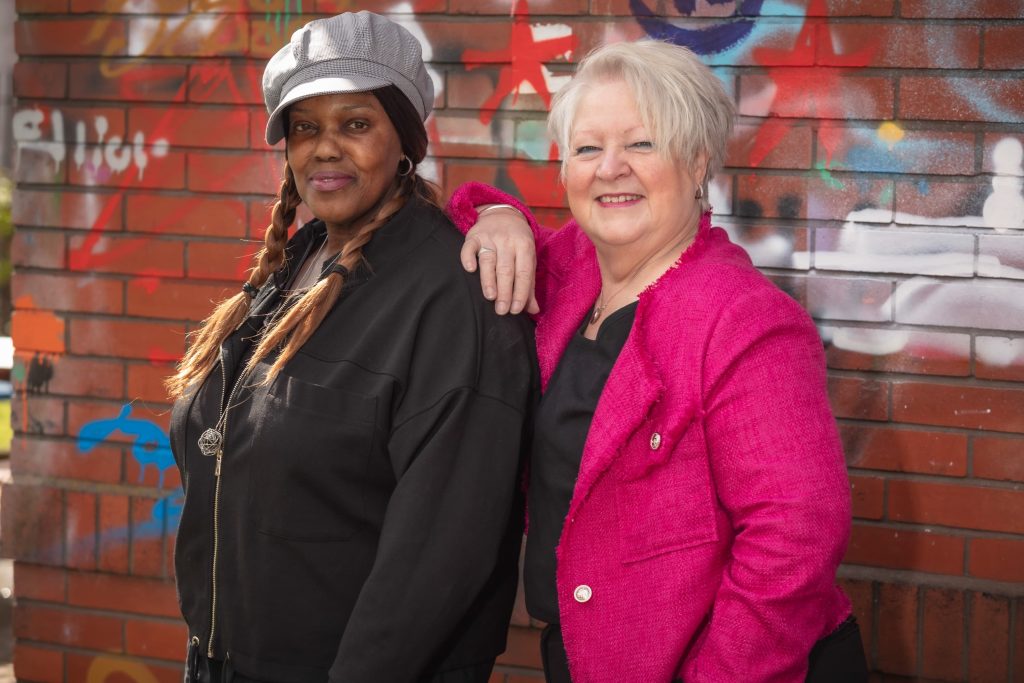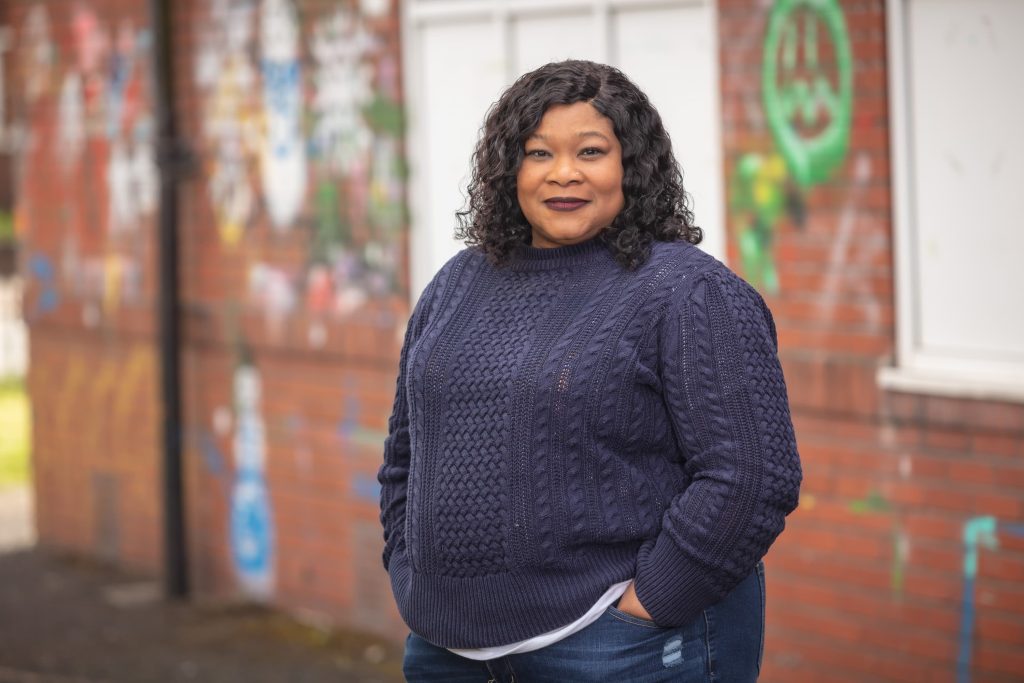In 2010 Grace McCorkle and Jan Tasker were both working in housing for the local authority. Grace developed housing services to support young people leaving care; Jan was in charge of housing conditions as a surveyor.
“We were both disgruntled with the system,” Jan says.
One night, Jan went to inspect a refuge for Muslim women she’d been asked to help with in Trafford.
“I called Grace and said come and have a look at this project with me. We went one night, stood on the pavement, and it was a light bulb moment.”
They decided to set up Collaborative Women, operating in an area that has one of the higher markers for deprivation in Trafford.
“It was born out of passion and frustration to fill an unmet need – to provide housing for young single women prone to abuse and fleeing abuse. Young women who were being forced into marriage, forced to go abroad, victims of female genital mutilation. Grace and I stepped in to fill that void.”
Collaborative Women marks its 10th anniversary in 2024; the team operates an emergency housing project in Trafford housing women in crisis.
Alongside safe, quality, affordable housing it runs its Moving Forward support programme, which works to equip women to live independently emotionally and economically.
Referrals come from organisations such as Women’s Aid and outweigh supply by 25%.
Last year, it increased its housing portfolio by 40% with 10 bed spaces and three properties. Over 600 women and girls benefited from its range of intervention programmes, offering pathways to connect, learn, and thrive; 16 women escaped abuse and were provided with safe accommodation, 12 of them moved onto employment, education, or volunteering. And 12 were also supported to move into permanent homes.
It also delivers classes, such as African drumming, Tango and Bhangra, advisory workshops in schools on healthy relationships, social events, and community days.

Its community outreach work originated with a partnership with Trafford’s library services, and brought women together, regardless of ethnicity or class, in a safe space to learn and support each other. They also offer one-to-one support on help with statutory services.
Grace says: “Many of the women dealing with social services, education, or legal matters such as child protection cases felt unsupported, that they didn’t have a voice, and had nobody in their corner, and we provided that over the years.”
It has a four-strong staff team, six board members, and up to eight volunteers. Many of the women they support go on to volunteer for them or become one of their ambassadors.
Despite the financial challenges, Jan says she was driven to build Collaborative Women.
“We didn’t earn money for a long time,” Jan says. “My drive came from a personal story and frustration trying to help a young woman being forced into marriage. Her father was threatening to kill her, and there was nowhere she could go.
My daughter was at college with her, the college wouldn’t help, so she was sofa surfing. We finally got her a place at the Foyer in Manchester for young people over 16 who are in education. It was soulless. Dreadful. She was as young naïve Muslim woman, who ended up in prostitution and drugs. So, Grace and I have created homes for women – not an institution, not a refuge – that’s my passion.”
Grace agrees: “Supported accommodation particularly for women from the African-Caribbean, South East Asian background was dire, so our focus is on marginalised women. As a black woman working in this space, I wanted to take up that gauntlet.”
Jan gives an example of a woman they’ve just housed who had been placed in temporary accommodation: “They’d all been given eviction notice, and kids were living in this place. It’s slimy, it’s filthy, its damp, rat infested, and this was a young woman on her own, not safe, with no lockable space, paying £500 a month of her own money.”
Grace says they’re not even dealing with the ‘tip of the iceberg.’
“Housing really is the fourth emergency service, but it doesn’t get that precedence and notice that it should do. We’re vastly running out of resources; there’s not the will from local or central government to address the problem. We’ve chosen to bridge the gap of housing provision for women. It’s minute, although the impact is major, we’re not tackling the full-scale of what’s needed.”
Key Fund provided a £40,406 loan and £7,274 grant to part fund a property purchase.
Jan says: “Key Fund believed in us. As a Community Interest Company, we can’t get loans or mortgages, but Key Fund offered a solution with a blended loan and grant.”
Key Fund connected them to Charity Bank who provided a mortgage, and they are now in the process of purchasing a second building.
Grace says: “The main impact of Key Fund has been to help our business grow. As a CIC, we were isolated from finance, but Key Fund could see a solution. We’re now upscaling ourselves. The amount of time Key Fund has invested to help our capacity building has been phenomenal. It’s opened a door.”
Jan agrees: “We’ve had support from a fund manager, one of the accountants there, and even Matt the CEO of Key Fund helped us with our business planning. It’s a massive support.”
Collaborative Women’s business model includes rental income and housing benefits.
They are now looking at sustainability and acquiring more property. “We want to be in existence for as long as we are needed,” Grace says.
Francesca Ohai is due to start a new job at Collaborative Women as a Housing and Community Support Worker.
Francesca is a single mum to two children.
“I was a victim of domestic abuse a long time ago.”
She had to stop work after issues with her visa; her husband refused to help.
“Things became very difficult for me financially; he was claiming my son’s child benefit. He was controlling. Sometimes, it got physical, a slap here and there. I did report him to the police once, but I got threats from his parents back home in Nigeria, and they threatened my parents, saying I shouldn’t get their son arrested.”
“It was really very hard for me getting out of that scenario. Eventually, I did. At the time, I didn’t know there was help out there, because of the fear of being stigmatised and castigated, I wasn’t able to speak out.”
She got a lawyer to help her with her immigration status and opened up about her situation. The Home Office eventually sorted her visa in light of her abusive situation.
“Eventually, I broke free, and it really took a toll on me going from one place to another, trying to build myself back up from scratch, and also trying to leave for my kids. It’s been a rollercoaster for a long time.”

She says: “It took years to rebuild myself. At that point, I had lost confidence, my self-esteem. I was then diagnosed with Fibromyalgia, so I had lots of health issues too. Eventually, I started rebuilding myself. I would take courses, and any training available, I started volunteering, I started meeting people and opening up, talking to people. Eventually, I got to where I am.”
During that time, she did access a couple of supportive groups, who helped.
“That’s why I’ve joined Collaborative Women, so I can work with women who are going through this phase of their life and let them know that there is help out there; they don’t have to be quiet, they don’t have to keep going back to domestic abuse scenarios. A large percentage of women in these scenarios go back to where the abuse is taking place. Eventually, some of them come out of it broken. Back home in Nigeria, I’ve heard of cases of women being killed in domestic abuse situations.”
Collaborative Women’s work she says is important, as it tells women they are not alone.
“We are here and will walk the distance with you,” she says.
What’s more, it gives women a ‘new lease of life’:
Francesca says she feels optimistic about her future: “If I can do it, I believe anybody else can do it as well.”
She says: “We are working as Collaborative Women to give women a voice, to let them understand there’s help out there. You can be who you want to be, you can be yourself, there’s help to lift you up.”
